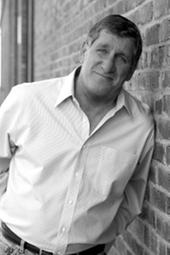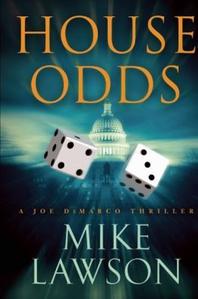
|
|
| photo: Tara Gimmer | |
Mike Lawson is the author of eight Joe DeMarco novels; the latest, House Odds, was just published by Atlantic Monthly Press. Joe DeMarco is a lawyer who doesn't actually practice law, but works for Speaker of the House John Mahoney. DeMarco does Mahoney's dirty work, getting involved in things the Speaker would rather not be a part of the public record. House Odds is about Mahoney's daughter, Molly, who's under investigation for insider trading and fraud; a mob-connected casino manager with his hand in the till; and three old college buddies who seem involved in some way.
How do you keep things fresh in this series? How do you not run out of ideas in this genre and these characters?
Well, so far, I haven't. When I decided to start writing--maybe this wasn't the best decision--I decided I wanted to write a series. I like John Sanford's books a lot, and I like Robert Crais's books. I like book series, so I decided to do one.
The second decision I made was that I wanted these books to be set in Washington, D.C. I've always told people that for a writer, D.C. is a target-rich environment, because there's always something going on there that's stupid, awful, corrupt and sometimes heroic. I wanted that setting, so I had to come up with a character that I could place there. I didn't want to do another cop or another private detective or a lawyer or something like that. I wanted something with kind of a political link. That's how I came up with Joe DeMarco. So far, I've been able to find story ideas.
Almost all the books except one of them actually came out of some true-life thing I read. House Odds, for example, was somewhat inspired by the Martha Stewart insider trading case. In an earlier draft of the book, I had Molly involved in the pharmaceutical industry. But then I wrote House Blood, which was connected to the pharmaceutical industry. I didn't want to use that again, so I changed the industry she was in to stock trading.
Do you do a lot of research on these areas?
I tend to research as necessary. One thing you do learn, though, is that you have to get the facts as straight as possible. I mean, it's fiction, but if you get the facts all goofed up, somebody will e-mail you and say, "You dummy, you messed this up." In my first book, I made a gun mistake. The last thing you want to do is make a gun mistake! You hear it from everybody! In fact, just this morning I sent an e-mail to my gun consultant, if you will. I had a couple questions about guns. For one of the books, I actually went over to his house and fired a couple of guns. I'm not a big gun guy.

I am almost hesitant to mention this. My mother's name was Pecoraro. Her father--my grandfather--came straight off the boat from Sicily, landed at Ellis Island, and he ends up in Pueblo, Colo., where I was raised. Back in those days, around the Depression, the stories I heard between my grandmother and him and my aunts sounded like he might have been sort of a minor collector for the mob. One story was that there was money kept in the house and a policeman would come by to collect his money.
And the other story, which I've never forgotten, I heard during a ride up to Denver. This was like 30 years ago. My mother and her sister were sitting in the back seat, and they were talking: "Remember the time when so-and-so got married to this girl and he wasn't supposed to marry her and then the guy just disappeared?"
And there's actually a book about the Colorado Italian mafia in Denver and places around there. And my grandfather was a bricklayer in a steel mill--had all these minor connections to the mob.
Was he a mob guy? I don't think so, but that's as close as I ever came to the mob. I always regret that I didn't spend a lot more time talking to my grandfather and my grandmother about it.
How much of Joe DeMarco is you?
Oh, most things of DeMarco are me. His thought processes and his reactions to events and about most things is kind of the way I would react to them.
I intentionally didn't make him an expert on anything. I didn't want him to be a special forces guy where I'd have to know a million different kinds of military weapons. He's a lawyer who doesn't practice law--I don't know anything about the law.
So that does give me an advantage in one respect, in that nobody expects DeMarco to know all this stuff. And so in the books, when I come across something I have to know, it usually involves one of the other characters, and I have to contact experts or look something up or do the research. I think it's easier for the reader to identify with somebody who isn't an expert in all these things.
What was the most challenging part of writing this particular book?
I think the struggle with DeMarco is finding the motivation for him to do bad things. I find I have to really work on that because he's not really a bad guy. In a lot of ways, he's almost too laid back. He's got a job that for him is just a job. He wants to wait until he can retire and go play golf. So I guess I'm always struggling a bit with what's going to motivate the guy. What's going to cause him to do this bad thing? It may not be super bad, but it's something out of character.
In House Odds, he's crossing a big line helping Mahoney cover up a case where his daughter is into something illegal. He can justify it, because the people that got her into it were these bad mobster guys and these bad politicians, but still. I do struggle to make it clear enough as to what motivates him.
What's the easiest part?
I like to show the bad guy perspectives. Because bad guys, in my mind, aren't Terminator-types that just aimlessly walk around killing people. Most bad guys probably think they're good guys. I enjoy taking it from whatever the character's perspective is, because that allows me to see how he's thinking.
Some of the mechanics--like dialogue and how you convey thoughts versus dialogue--is easier than it was for me in the first couple of books. I think once I know where the story is going, it's not usually too much of a struggle. You figure out the characters, and you figure out the story, and the characters obviously help you write the story because you're writing from their perspective. --Rob LeFebvre, freelance writer and editor

